The premier of Victoria, Jacinta Allan, has appeared before the Yoorrook Justice Commission—Australia’s first truth-telling inquiry, which has the same powers as a royal commission.
She is the first head of an Australian government to appear before such an inquiry, established to investigate the impact of past and present events on Indigenous communities.
The commission name “Yoorrook” means “truth” in the Wemba-Wemba/Wamba-Wamba language spoken around north-western Victoria.
Commissions in other countries such as Canada and South Africa have uncovered widespread and significant violations of human rights. Yoorrook is the first commission to be established in Australia, and its findings are expected to inform Victoria’s treaty process.
Part of the Treaty Process
Ms. Allan said preparing for her appearance had taken her on a “learning journey.”
“It saddens me that I did not have the opportunity to learn that at a much younger age,” she said.
She was unable to discuss her specific evidence, but said she was “deeply humbled” to appear before the commission.
“The truth-telling process is such an important part, indeed, a critical part … of the treaty process,” she said.
“At times, that truth-telling has been challenging, challenging for governments, challenging for organisations and institutions, but it must be done because we can’t have a treaty without telling the truth about how our state was colonised.”
She said the failed Voice referendum had made her “more determined to work incredibly hard” to “present the facts” about Victoria’s history and the inequalities faced by the First Nations people.
“There is absolutely a responsibility [on] government to present the facts,” she said.
Victorians Will Be Encouraged to Read Evidence
The premier said the state government wanted to ensure Yoorrook’s evidence and findings were widely read and disseminated.
“There is also the opportunity for us as a government to think about how we promote this more, talk to people more, say ‘go and look at the Yoorrook website, watch videos on the impacts of dispossession of land and water, the impacts that came about from colonisation in our justice system today,’” she said.
Ahead of the Voice referendum last year, New South Wales Premier Chris Minns said he was open to a truth-telling process, which is also underway in Queensland and Tasmania.
South Australia has committed to implementing a state-based treaty process before truth-telling. Western Australia is the only jurisdiction which has not committed to discussing treaties with its Indigenous peoples.
